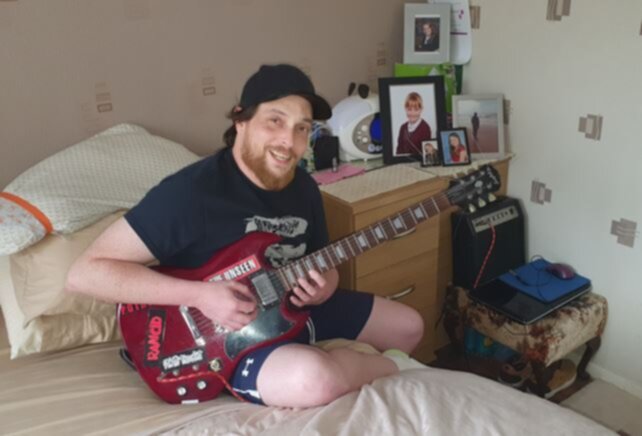

Meet Tim
"We were gigging two or three nights a week, so you were up all night three or four times every week. We partied way, way too much. "
Tim’s bedroom at his parents’ house in Caerphilly is almost boredom-proof. On the floor next to his bed lies a rolled up yoga mat and a pair of dumbbells.
Standing against the wall, waiting to be picked up and put down at will, is his deep red Epiphone electric guitar complete with faded stickers from bands like Rancid and Static Thought.
Before coronavirus took over, Tim, 37, was about to start his new voluntary peer mentor role with Cyfle Cymru in Newport, which helps support people with substance and mental health issues, before government guidelines meant it had to close until further notice.
A Slippery Slope
Just 12 months ago Tim was drinking so heavily that even after waking up in the morning with a violent hangover, his first thought was to go to the shop for a bottle of whiskey.
He admits his substance issues dated back to when he started using drugs with his friends in school.
“I started smoking cannabis, and then it went on to experimenting with heavier drugs, as a lot of people did. I noticed a lot of people seemed to have the ability to stop, which I seemed to lack. I became an addict.”
Then a teenager, Tim says he began selling drugs and said things “spiralled out of control” from there. “Before I realised I was smoking crack, I had no money, I’d lost my flat, ruined relationships.”
The Music Scene
A passionate musician, Tim joined a punk band and did the local live circuit for many years, which he says caused his drug use to escalate.
“We were gigging two or three nights a week, so you were up all night three or four times every week. We partied way, way too much. Looking back it was very stupid. I don’t know how I’m still alive to be honest with you.”
Although he had used drugs throughout his adult life, it was only two years ago when his marriage broke down that Tim developed an alcohol dependency.
“I did drink when I was out doing drugs and socialising, but I wasn’t drinking every day. Before I knew it, I was drinking half a litre to a litre of whiskey every day.”
Ready for Change
He says the tipping point came a year ago when he woke up in his parents’ house after a night of heavy drinking.
“I woke up in the morning with a terrible hangover after drinking whiskey I’d snuck into my bedroom. It was just after my relationship broke down.
The first thing that came to my mind was to go to the shop and buy more whiskey even though I was in a terrible state. My parents were saying I was drinking too much but I was in denial, saying I wasn’t, the usual thing. But I suddenly realised they were right.”
In need of help, Tim reached out to our Gwent Drug and Alcohol Service (GDAS) project and was put on a harm reduction program which helped him come off both alcohol and drugs.
“I don’t think I would’ve dealt with the drugs issue if I hadn’t addressed the alcohol issue to be honest,” he admits.
“The tools I learned and developed for alcohol addiction helped me stop everything else.”
Tim still attends his weekly SMART recovery meetings online which offer support to people in recovery, as well as other online events, exercise and music to keep himself occupied.
“To tell you how bad my drinking was, I picked up the guitar the other day and found an empty whiskey bottle in the guitar case.
I was thinking I didn’t even remember hiding bottles all over the place like that – that’s how bad it was!”
Feeling Lucky
Tim counts himself lucky and says many who are struggling with addiction during lockdown might be isolated and unaware of the help available during the pandemic.
In Wales, drug and alcohol services provided jointly by Barod and Kaleidoscope are receiving just 30% of new alcohol referrals compared with this time last year in some areas.
The providers have launched the Time to Brew campaign to encourage anyone struggling to seek help through advice and professional information and guidance.
“People shouldn’t be afraid to reach out, because services are still available,” Tim says.
“Drinking does seem to be becoming an everyday thing. People feel like it’s a holiday so they’re drinking more, and I worry that services will be overrun when lockdown ends.
“People need to be mindful of their drinking, even if it means taking a few days off just to prove they can do it.
“There is nothing else to do for a lot of people. Alcohol is a depressant and should not be used as an excuse to kill boredom.”
Tim is staying with his parents at the moment and the father-of-three says he also chats to his kids on FaceTime every day.
“Whenever I feel a bit down, I get up and do something to occupy myself and make myself feel good, that isn’t alcohol-related.
“I’ve never been apart from my kids for longer than a week but because of lockdown I haven’t been able to see them in about seven weeks, which is hard.”
I do have my bad days, but I’m just trying not to let them get me down


